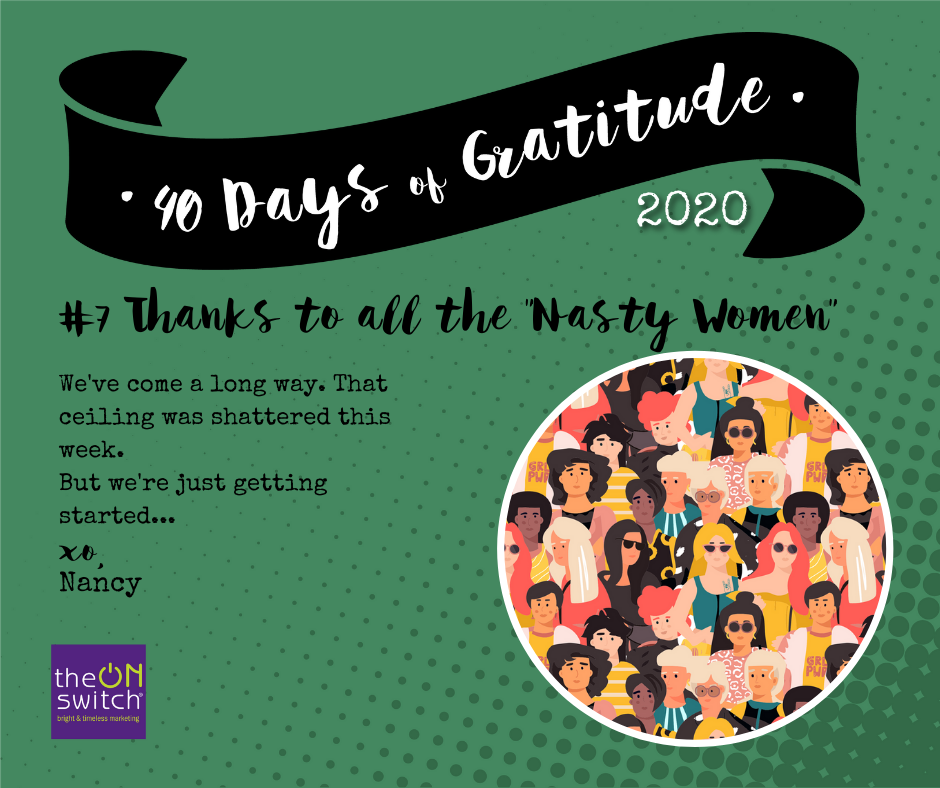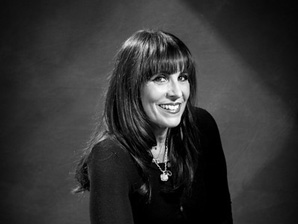Gratitude #7: All The “Nasty Women” (The Grateful 40)
 Reading Time: 3 minutes
Reading Time: 3 minutesThis week, a woman did something amazing.
She became the first woman to serve as Vice President.
As a little girl in the 1960s, I wrote that I wanted to be a nurse or a teacher.
After all, those were the “girl jobs.” A gig as a flight attendant (or stewardess, as they were called by then) didn’t appeal to me. Perhaps I didn’t like the uniforms or the fact that I had to smile all the time.
I was very aware throughout my early education that girls and boys were treated differently. The science and math teachers favored the guys in my classes and I was only allowed to take “Home Economics” (like sewing, child care, and cooking) but not Wood or Electrical Shop. I had to wear a skirt to school every day.
Fueled by the feminist movement, I eventually broke free of stereotypes and pursued a government career while in high school and college. I saw woefully few women on the Hill when I worked in D.C. The following summer, I could only get a civil service job, typing, and getting coffee. I bailed on a government career and decided to work in the private sector.
Even when I graduated college (with solid grades and work experience), I had to take a secretarial job to get my career jump-started. The late 1970s were still very much the Peggy Olson era. Men made decisions. Women made coffee.
I chose a media company that had a high turnover rate, to increase my chances of a promotion. I wrote my graduate thesis on the status of women in publishing and discovered that fewer than 5 percent of senior leadership in the industry (which was primarily female) was comprised of women.
At my first-ever sales meeting (in my early 20’s), a senior executive declared at a cocktail party, “You look good enough to rape.” The Queens girl in me took over and I glared and shut him down, but I worried about the aftermath because we didn’t even have HR departments to talk to back then.
Little by little…
During my financial services career era, I began to see more women in positions of power and responsibility. We often had to choose between family responsibilities and career advancement.
We had no technology to keep in touch after we left the office at the end of the day (unless you count fax machines).
And women were reticent to bring other women along as they reached the top. When I asked a woman boss if I could attend a senior meeting, she said, “It took me 10 years to get here. Why should I make it easier for you?”
Sadly, she was not the only woman leader who felt that way. Many of my career breaks during that era came as a result of men’s mentorship and opportunities, rather than the support of other women.
When we achieve positions of power we’re sometimes referred to as “nasty,” “aggressive,” and “whiney.” But that’s all beginning to change, little by little.
The tech world of the 2020s is not unlike the financial services world of the 1980s. The “bro culture” is gradually changing, but sexism and ageism (especially towards women) are realities.
We’re just getting started.
I am thrilled that my daughters and granddaughter will grow up in an era with a strong female role model running the country. They will be able to speak up without fear of retribution.
We will all (I hope) lift each other up and abandon the competition, gossip, and jealousy that often ensue from a mentality of scarcity and fear.
Although nursing and teaching are actually great career options these days, we have many other choices. Technology enables us to contribute to the C-Suite even when we need to be at home.
We still need to:
- Speak up when we see gender-based wage disparities.
- Treat men as allies and not enemies. The right men will always listen to what we have to say.
- Lift other women up as we rise. Avoid gossip and trash talk and petty bullshit.
- Respect women of ALL ages.
So, today, I want to express thanks to the women role models throughout history — the “nasty” women and supportive men who spoke up to make the change and clear the way for the rest of us to thrive and prosper.
And who knows? Maybe I’ll go back to work in government one day…


HI Nancy,
I am truly enjoying your Gratitude series. Thanks for sharing all these great stories and remarkable people. This one especially – Nasty Women — hit a cord with me, though my high school and early career experiences were very different. I was a strong Math student in high school (with wonderful female math teachers) and majored in Math in College. My first professional job was as a “computer programmer traineee” in a financial services company, and I was very fortunate to have male bosses who believed in me, even more than I believed in myself.
Long story short — it wasn’t until I was at the VP level that I encountered my first overt discrimination, including working for a “queen bee”. I left that company to join an early stage tech services startup and never looked back. It wasn’t all nosey, and along the way, I encountered many small minded male leaders and a few MeToo episodes, but I feel very fortunate to have had a very positive career in IT and professional services.
The tech industry today is much less welcoming to females than what I experienced many many years ago. Statistics show that % of females in tech roles peaked around 1992, and has hovered at 25% ever since, so I guess my timing was right. (I am at least 10-15 years older than you).
Now I focus on giving back – helping young women succeed in tech careers, speaking out on Diversity, Inclusion & Equity, and being a late in life entrepreneur with my executive search practice where I can practice what I preach.
Thank you so much for sharing, Diane! You are doing such important work. I was encouraged on the Arizona Tech Council call this week by the fact that many of the attendees were women (including several of our generation). But “mansplaining” and the all-male panels (manels) and boys’ club golf outings are still a reality in the tech world. By the way, I’m 64 and have worked in tech-related businesses since my 20’s. I call us the OGs (original gangstas) of technology. We have much to teach future generations of women and men. The bright ones will benefit from our experience, calm, and wisdom.
Again, grateful for the comment. Only by sharing our stories and learnings can we raise awareness and make change!